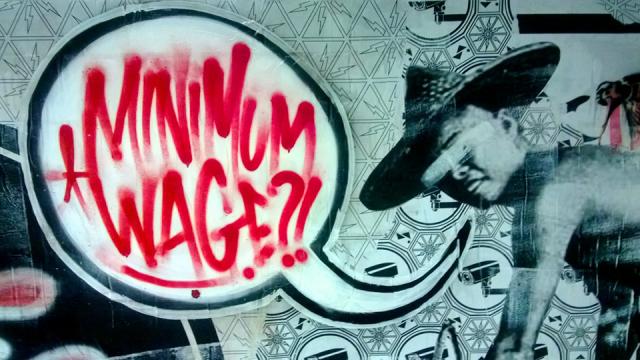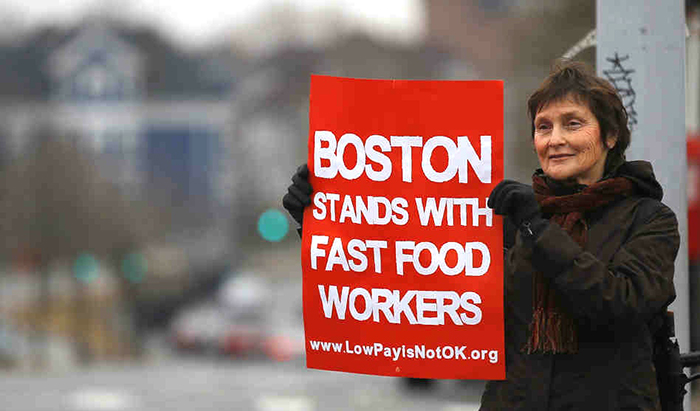
Judging by the past three months, 2014 is on track to become the year of local minimum wage laws. Campaigns are under way in Richmond, Berkeley and Oakland to join San Francisco and San Jose in setting a minimum wage higher than state law.
These are echoed by similar initiatives in Los Angeles and San Diego. The trendsetter, San Francisco, is itself looking to go higher, with a new proposal to raise its minimum wage to $15 an hour. And state Sen. Mark Leno, D-San Francisco, has a proposal to raise the state minimum wage to $13 by 2017.
California is not unique. Cities and states across the country, like Seattle, South Dakota and even Arkansas (the home of Walmart), are looking to either establish or raise their local wage floors, with three states acting just in the last three weeks alone.
What's driving this groundswell of local policymaking? At root, it is a response to the profound growth in economic inequality over the past four decades, combined with an equally profound political failure to respond at the federal level.
The inequality story has, of course, dominated national headlines, especially the astounding gains of the top 1 percent. But it's worth reviewing the flip side of the coin, namely the growing economic insecurity of working families. Here are three trends that best illustrate their struggles.
First, real wages for low- and middle-income workers have stagnated or declined while incomes at the top have skyrocketed. In California, inflation-adjusted wages for the bottom two-thirds of the workforce were lower in 2012 than they were 12 years before.
According to the National Employment Law Project, while mid-wage occupations accounted for 60 percent of the jobs lost during the great recession, low-wage occupations accounted for 58 percent of net job creation during the first three years of the recovery.
A second trend is that as housing costs spike in response to greater demand, more and more people cannot meet their basic needs. Rental costs are escalating everywhere, and acutely so in the Bay Area. Between 2005 and 2013, median rents in San Francisco rose 35 percent while the minimum wage increased just 19 percent.
In 2005, it would have taken 130 hours working at the minimum wage just to pay median monthly rent; by 2012 that figure was 148 hours. And note that calculation includes long-occupied units under rent control; rents for new tenants have risen even more.
Finally, as the economy has changed, so have the demographics of low-wage workers. According to the Center for Economic and Policy Research, in 1979, 26 percent of low-wage workers were teenagers and 39.5 percent had less than a high school education. By 2011, only 12 percent of low-wage workers were teenagers and more than 80 percent had a high school education or more.
In fact, more than a third had attended at least some college. The upshot is that we can't educate our way out of the low-wage jobs problem; since 2000, real wages have actually fallen for those with a bachelor's degree.
This is a grim story, and multiple failures in our national public policy helped bring it about.
Exhibit No. 1 is the eroding value of the minimum wage. If the federal minimum wage had kept up with the cost of living since 1968, it would be $10.60 an hour today, not $7.25. If it had kept pace with growth in productivity, it would be an astounding $22.62.
It's no surprise then that the inequality debate has moved to states and cities – where it is finding fertile ground in low-wage worker organizations, the growing power of immigrant workers, and labor and community coalitions advocating to ensure that economic development creates quality jobs. Today, 25 states and nine cities and counties have set minimum wages higher than the federal minimum wage.
We want to be clear: To truly fight inequality we need the scale of federal resources, the breadth of federal labor standards and the coordination that only a national good-jobs agenda can deliver. But even when the federal government finally acts, there are good reasons for local governments to set their own minimum wage levels that reflect their higher cost of living. And there is considerable evidence that they can do so without harming economic growth or employment.
In the new campaigns to raise the local wage floor, we see a return to a long and proud history in the United States where states and cities are laboratories of policy innovation and grassroots organizing that then build momentum for national change. As a result, an innovative new way of thinking about inequality is emerging, where urban centers and regions like the Bay Area with higher costs of living use a range of tools, including robust minimum wage laws, to ensure that growth and prosperity are broadly shared.
Ken Jacobs is the chair of the UC Berkeley Center for Labor Research and Education, and co-editor of the recently published book "When Mandates Work: Raising Labor Standards At the Local Level". Annette Bernhardt is a visiting professor of sociology and researcher at the UC Berkeley Institute for Research on Labor and Employment, and is a fellow at the Roosevelt Institute.
3 WAYS TO SHOW YOUR SUPPORT
- Log in to post comments












